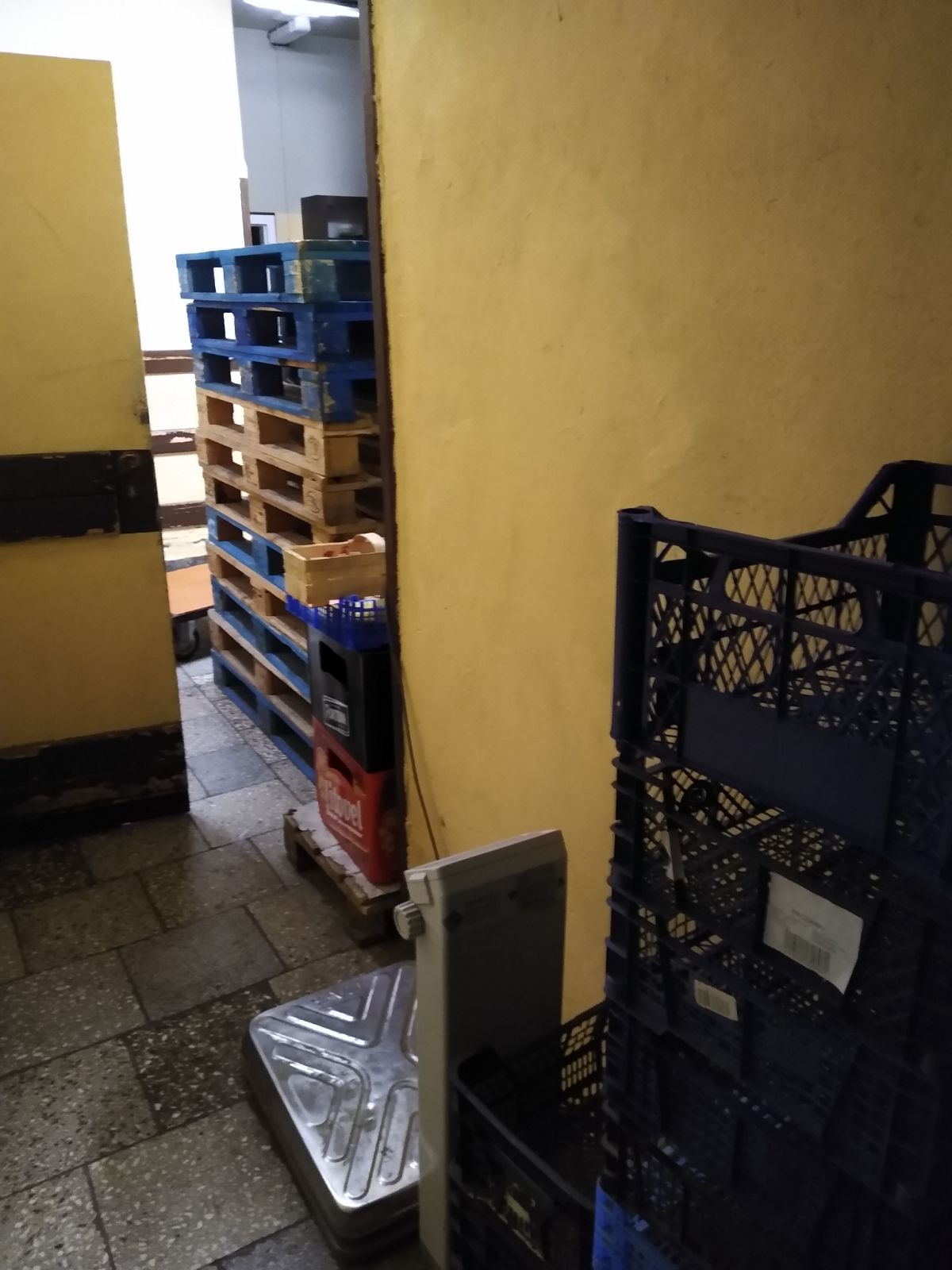Znikający punkt
Wkrótce zniknie. Nie ma innej możliwości. To w ogóle, że jeszcze funkcjonuje wydaje się być naprawdę nieprzystające do rzeczywistości. Kiedyś jeszcze wydawało mu się, że to może trwać i trwać. Pandemia pokaźnie dała mu się we znaki, a teraz galopująca inflacja, generująca społeczną biedę wydaje się przypieczętowywać jego los. Poza tym rząd w Polsce zawsze kochał przedsiębiorców i ich składki. Niezależnie od wyniku finansowego. Kocha ich coraz bardziej. Adam jest właścicielem spożywczego sklepu osiedlowego. Do niedawna jeszcze dwóch. Przekroczył już wiek emerytalny, ale nadal musi pracować.
Przywiązanie to tylko generator bólu głowy. Wszędzie to słyszy. Choć jest wdzięczny, że są jeszcze tacy, którzy u niego kupują. To przeważnie ludzie w jego wieku lub starsi. Litują się nad nim swoim marnym groszem, wie że u nich to też przyzwyczajenie. Starych drzew się przecież nie przesadza, zdechną na każdej innej glebie poza znajomą. Wie, że jedzą coraz mniej. Może dlatego tonie tak długo. Młodych jest już tutaj niewielu, chyba tylko ci co pracują na sąsiedniej budowie i przychodzą rano po pieczywo i alkohol.
Dyskonty i franczyzy otaczają go jak pętla. Od lat, ale przepaść się pogłębia. Mają wszystko w przystępnych cenach. Żywność też, ale nie takiej jakości jak u Adama. Mięso i ryby zawsze miał świeże. Tak samo warzywa i owoce. Dba o dobre relacje z dostawcami. Nigdy nie malował karczku, aby wyglądał na bardziej krwisty. Nie wyłączał lodówki na noc. Nie sprzedawał przeterminowanych produktów. Uważa, że mielonką od konkurencji można sobie co najwyżej zalepić jelita.
Ale teraz takie przedsięwzięcia poddaje się faktycznej eutanazji. Niewidzialna pięść rynku wspierana przez postępującą fiskalizację państwa. We Wrocławiu prawie już nie ma takich sklepów. Wie że jest drogi. Ale za tym idzie jakość, którą od lat oferuje. Powoli nie stać go nawet na obniżenie jakości. Zawsze już będzie droższy, ile by to „zawsze” nie miało trwać.
Ściany zostały niedawno odmalowane, ale posadzka z lastryko przypomina, że lokal ma już swoją historię. W sklepie brak kamer, ochroniarze nie strzegą jego półek. Alarm jest atrapą. Dlatego zdarza się, że towar po prostu wyparowuje. Kto by go dzisiaj chciał szukać, kiedy kradzież poniżej 500 złotych właściwie to kradzieżą nie jest. Zwykłe wykroczenie, znikoma społeczna szkodliwość czynu. Remanent wykazał, że przez ostatni miesiąc wyniesiono mu towaru o wartości rocznego czynszu.
W drugim sklepie czynsz podskoczył mu czterokrotnie, tak więc od przyszłego tygodnia zostaje już tylko tutaj. Wszystkich ludzi stamtąd nie weźmie, choć kredyty mają tak samo jak on. Żeby być szczerym, nie płaci dobrze. Nie stać go, gdyby mógł, to by płacił więcej, dawał premie, dodatki, cokolwiek. Bardzo się boi. Nie umie już rozpoczynać.
Fluchtpunkt
Bald wird er weg sein. Nichts führt daran vorbei. Dass es überhaupt noch funktioniert, scheint völlig unvereinbar mit der Wirklichkeit zu sein. Er glaubte einmal, dass es so weitergehen könnte. Die Pandemie hat ihn spürbar mitgenommen, und jetzt wird die galoppierende Inflation, die soziale Armut erzeugt, höchstwahrscheinlich sein Schicksal besiegeln. Außerdem hat die Regierung in Polen schon immer Unternehmer und ihre Beiträge gemocht. Unabhängig von ihrer Wertentwicklung. Sie mag sie immer mehr. Adam ist Besitzer eines kleinen Lebensmittelladens. Bis vor kurzem waren es noch zwei. Er hat das Rentenalter erreicht, muss aber noch arbeiten.
Bindung erzeugt nur Kopfschmerz. Das hört er überall. Obwohl er dankbar ist, dass es immer noch Leute gibt, die bei ihm einkaufen. Das sind überwiegend Menschen in seinem Alter oder älter. Mit ihrem Kleingeld erbarmen sie sich seiner, aber er weiß, dass es auch für sie eine Gewohnheit ist. Alte Bäume verpflanzt man nicht, sie werden auf jedem anderen Boden als dem vertrauten sterben. Er weiß, dass sie immer weniger essen. Vielleicht ertrinkt er deshalb so lange. Es sind kaum noch junge Leute hier, wahrscheinlich nur die, die auf der benachbarten Baustelle arbeiten und morgens Brot und Alkohol holen kommen.
Discounter und Franchise-Unternehmen schnüren ihn ein wie eine Schleife. Seit Jahren schon, aber die Kluft vergrößert sich. Sie haben alles zu günstigen Preisen. Auch Lebensmittel, aber nicht so gute wie Adam. Er hatte immer frisches Fleisch und Fisch. Genauso wie Gemüse und Obst. Er kümmert sich um gute Beziehungen zu den Lieferanten. Er hat keinen Schweinekamm bemalt, damit er blutroter aussieht. Er hat die Kühltruhe nicht über Nacht ausgeschaltet. Er hat keine abgelaufenen Produkte verkauft. Er findet, dass man sich mit dem Hackfleisch der Konkurrenz nur den Darm verklebt.
Aber nunmehr sind solche Handlungen gleichsam einer wirklichen Euthanasie unterworfen. Die unsichtbare Faust des Marktes, unterstützt durch die fortschreitende Fiskalisierung des Staates. In Wrocław gibt es fast keine solchen Läden mehr. Er weiß, dass er teuer ist. Aber damit geht die Qualität einher, die er seit Jahren bietet. Langsam aber sicher kann er sich eine Qualitätsminderung nicht leisten. Er wird immer teurer sein, gleich wie lange dieses „immer“ auch dauern mag.
Die Wände wurden vor kurzem neu gestrichen, aber der Terrazzo-Boden verrät, dass das Geschäft bereits seine Geschichte hat. Es gibt keine Kameras im Laden und keine Sicherheitsleute, die seine Regale bewachen. Die Alarmanlage ist eine Attrappe. Daher kommt es vor, dass sich die Ware einfach in Luft auflöst. Wer würde sie heutzutage suchen wollen, wenn der Diebstahl von weniger als 500 Złoty eigentlich kein Diebstahl ist. Eine gewöhnliche Ordnungswidrigkeit, ein vernachlässigbares Bagatelldelikt. Die Inventur zeigte, dass ihm im letzten Monat Waren im Wert der Jahresmiete gestohlen wurden.
Im zweiten Laden hat sich die Miete vervierfacht, also bleibt er ab nächster Woche nur noch hier. Er wird nicht alle Leute von dort weiterbeschäftigen, obwohl sie Kredite wie er abbezahlen. Um ehrlich zu sein, er zahlt nicht gut. Er kann es sich nicht leisten. Wenn er könnte, würde er mehr zahlen, Prämien geben, Zulagen, was auch immer. Er hat große Angst. Er kann nicht mehr von Neuem anfangen.
Übersetzung: Michael Pietrucha
A vanishing point
Soon, it will disappear. There is no other possibility. The fact that it still exists really seems to be at odds with reality. He once believed that it could last and last. The pandemic has taken its toll on him, and now the galloping inflation which generates social poverty is sealing his fate. Furthermore, the Polish government has always loved entrepreneurs and their contributions. Regardless of their profits. It loves them more and more. Adam owns a neighbourhood grocery store. Until recently, he owned two more. He has already reached retirement age but still must work.
Attachment only generates headache. That’s what he hears all around. He’s thankful, though, that there are still people who buy at his store. They are usually his age or older. They take pity on him with their pennies, he knows that they are used to him as well. In the end, you can’t teach old dogs new tricks. He knows that they eat less and less. Maybe that’s why he’s been sinking for so long. There are not too many young people left around here, maybe only those who work on the construction site nearby and drop by every morning for some breadstuff and alcohol.
Discount chains and franchises have been surrounding him like a noose for years, yet the abyss is widening. Whatever they sell is at a reasonable price. Food as well, but it doesn’t match the quality of Adam’s products. The same goes for fresh produce. He cares about maintaining good relationships with his suppliers. He’s never dyed pork neck to make it look more rare. He’s never unplugged the refrigerator overnight. He’s never sold expired products. He believes that the only thing the ground meat sold by his competitors is good for is clogging your intestines.
But now enterprises like Adam’s undergo an actual euthanasia. The invisible fist of the market is supported by the country’s ongoing fiscalization. In Wrocław there are barely any stores left like this one. Adam knows that his goods are expensive. But the price goes hand in hand with the quality he’s been offering for years. Gradually, he cannot afford to lower it. He will always be pricier, however long that “always” should last.
The walls have recently been repainted, but the terrazzo floor is a reminder that the store has a history. You won’t find CCTV cameras here; security guards do not guard the shelves. The alarm is fake. Therefore, it happens that the stock vanishes into thin air. Who would feel like looking for stolen goods today, when a theft under 500 złoty is not really considered a theft at all? It’s just an ordinary misdemeanour, an act of negligible social depravity. Stock counting has shown that, last month, goods worth a year’s rent were shoplifted.
The other store’s rent rose four times so, since last week, you can find Adam only here. He cannot take all the staff with him, even though they have loans just like he does. To be completely honest, the wages he pays are not even that high. He cannot afford it; he would if he could, he would give bonuses, allowances, whatever. He’s very apprehensive. He doesn’t know how to start over anymore.
Übersetzung: Klaudia Cierluk
Teilen












